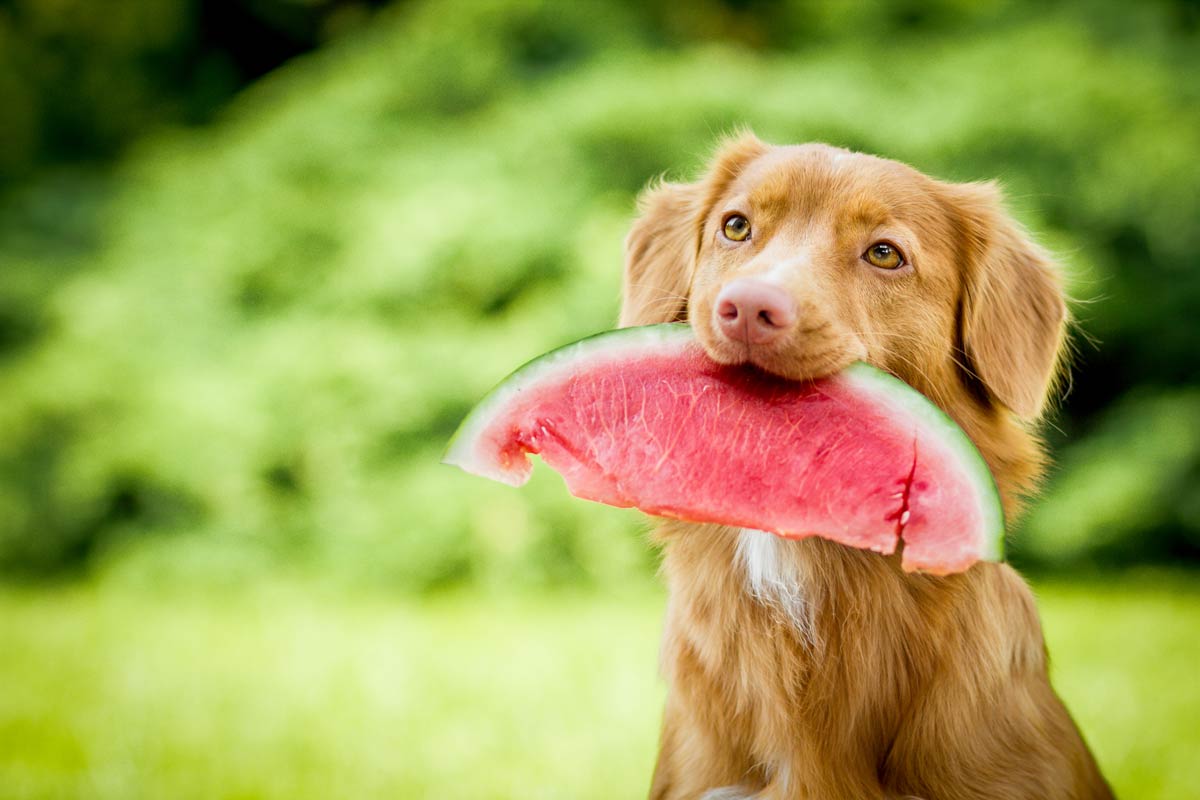Can Dogs Eat Fruit? Which Ones Are Safe?

Are you curious about whether or not your furry companion can enjoy some of the same fruits that you do? The answer is yes but with certain precautions.
Dogs can benefit from a balanced diet that includes fruits as a healthy snack or in addition to their regular meals. However, it’s important to know which fruits are safe for them to consume and in what quantities.
A dog’s digestive system is different from ours, so not all fruits are suitable for them. Some may even be harmful and cause health problems such as upset stomachs or diarrhea.
Knowing which fruits are safe and how much is appropriate for your pup can help ensure they receive the nutritional benefits without any negative side effects. In this article, we will discuss the importance of a balanced diet for dogs, safe fruits to feed them, ones to avoid, and tips on introducing fruit into their diet.
The Importance of a Balanced Diet for Dogs
You’ve got to make sure your pup gets a balanced diet, or they won’t be able to live their best life. Proper nutrition is essential for dogs, just as it is for humans.
Nutritional requirements for dogs include protein, carbohydrates, fats, vitamins, and minerals. Dogs need a balanced diet that meets these nutritional requirements so that they can maintain healthy skin and coat, strong muscles and bones, a healthy immune system, and good digestion.
While commercial dog food can meet these requirements, many pet owners prefer homemade dog food because it gives them more control over what goes into their pet’s meals. When making homemade dog food, it’s important to ensure that all the necessary nutrients are included in the recipe. You should also avoid including ingredients that may be harmful to your pet such as onions or garlic which can cause toxicity in dogs.
A balanced diet should provide all the necessary nutrients without any excesses or deficiencies. Now that you understand how important it is to provide your pup with a balanced diet, let’s move on to discussing safe fruits for dogs.
Safe Fruits for Dogs
Indulging in certain juicy treats can be a delightful experience for your furry friend, but it’s important to know which ones won’t cause harm. Incorporating fruits into your dog’s diet is not only safe, but also beneficial. Fruits provide essential vitamins and minerals that can boost your pup’s immune system and support overall health.
Here are three safe fruits that you can incorporate into your dog’s diet:
- Apples – remove the seeds and core before feeding them to your pup as they contain cyanide which can be harmful.
- Blueberries – high in antioxidants that help prevent cell damage and aging.
- Watermelon – full of vitamins A, B6, and C, as well as potassium.
Incorporating fruit into dog training is also a great way to keep them engaged and motivated during training sessions. You can use small pieces of fruit as rewards for good behavior or as a distraction during grooming or nail trimming.
As much as we want to treat our pups with all kinds of fruits, some may pose risks to their health. In the next section, we’ll discuss the types of fruits that should be avoided when feeding your furry friend.
Fruits to Avoid
You should be aware that there are certain fruits that you should avoid feeding your furry friend. Grapes and raisins, for instance, have been known to cause kidney failure in dogs.
Avocado is also a fruit that can be harmful to dogs as it contains persin, a toxin that can cause vomiting and diarrhea.
Cherries are another fruit to steer clear of since their pits contain cyanide which can be toxic to dogs if ingested.
It’s important to keep these fruits away from your pup and opt for safer options instead.
Grapes and Raisins
If you’re wondering whether your furry friend can eat grapes or raisins, unfortunately the answer is no. These fruits are toxic to dogs and can cause kidney failure. Even small amounts of grapes or raisins can be dangerous, so it’s best to keep them out of reach from your pup.
To ensure your dog stays healthy and happy, there are plenty of alternatives to grapes and raisins that you can offer as treats. Some safe fruit options for dogs include apples (without the seeds), bananas, blueberries, strawberries, watermelon (without the rind or seeds), and cantaloupe. By choosing these options instead of grapes or raisins, you’ll be keeping your furry friend safe while still providing them with a tasty snack.
Now let’s move on to discuss another potentially risky fruit for dogs: avocado.
Avocado
Now, before you start snacking on that avocado toast, beware of the potential danger it may pose to your furry companion. Avocado toxicity is a real concern for dogs as they contain persin, which can cause mild to severe gastrointestinal issues such as vomiting and diarrhea. Additionally, the large pit in the center of an avocado poses a choking hazard or could potentially cause intestinal blockage if ingested.
But fear not! There are plenty of alternative fruit options that are safe and healthy for dogs to eat. Some great choices include apples (without seeds), bananas (in moderation), blueberries, strawberries, and watermelon (without seeds). These fruits are not only tasty but also provide essential vitamins and minerals for your pup’s overall health. So next time you’re looking to give your dog a fruity treat, skip the avocado and opt for one of these safer alternatives.
As we move onto discussing cherries, keep in mind that not all fruits are created equal when it comes to being safe for our four-legged friends.
Cherries
Get ready to indulge in some sweet and tasty treats with cherries, but be cautious when sharing them with your furry friend. Cherries are safe for dogs to eat in moderation, but the pits and stems should be avoided as they pose a choking hazard.
Additionally, cherries contain cyanide which can lead to cherry toxicity if consumed in large amounts. Despite the potential risks, there are also nutritional benefits associated with feeding your dog cherries.
Cherries are rich in antioxidants, fiber, and vitamins A and C. They can help improve digestion, boost immunity, and promote healthy skin and coat. However, it’s important to introduce cherries gradually into your dog’s diet and monitor their reaction to ensure they don’t develop any adverse effects.
Remember that moderation is key when it comes to feeding fruit to your furry friend.
Moderation is Key
Maintaining a balanced diet for your furry friend is like walking a tightrope; moderation is key when it comes to feeding them fruit. While fruits are generally safe for dogs, they should be given in moderation as too much can lead to digestive issues and weight gain.
Balancing treats with portion control is important to ensure that your dog gets the nutrients they need without overindulging. In addition to portion control, physical activity and exercise routine also play a crucial role in maintaining your dog’s health.
Fruits can be a great addition to their diet as they provide essential vitamins and minerals that support their overall well-being. However, it’s important not to rely solely on fruits as a source of nutrition and instead incorporate them into a well-rounded diet.
Introducing fruits to your dog can be done gradually by starting with small amounts and monitoring their reaction. It’s also important to research which fruits are safe for dogs as some may contain harmful substances or seeds that can cause choking hazards.
By incorporating fruits into your dog’s diet in moderation and alongside other healthy foods, you can help promote their overall health and well-being.
Introducing Fruits to Your Dog
When introducing fruits to your dog, it’s important to do so slowly. Introduce new foods one at a time and in small amounts, watching for any signs of allergic reactions such as vomiting or diarrhea.
It’s also important to consult with your veterinarian before introducing anything new into your dog’s diet, especially if they have any underlying health conditions.
Slowly Introduce New Foods
Gradually introducing new fruits to your dog’s diet can help prevent any digestive issues and ensure that they can safely enjoy these healthy treats. Here are some tips to keep in mind when transitioning diets:
- Start small – Begin by offering a small amount of fruit as a treat or mixed with their regular food. This allows their system to adjust slowly without causing any upset stomachs.
- Monitor for reactions – Keep an eye on your dog after they try a new fruit. Look out for signs of vomiting, diarrhea, or changes in behavior, which could indicate an allergic reaction.
- Be consistent – Once you have introduced a new fruit into your dog’s diet, continue to offer it regularly so that their body becomes accustomed to it.
- Consult with your vet – If you have concerns about whether certain fruits are safe for your pet, talk to your veterinarian before adding them into their diet.
Remember that not all dogs will react the same way to different foods, and what works for one may not work for another. So always watch for any signs of allergic reactions before moving onto the next step about ‘watching’ in the subsequent section.
Watch for Any Signs of Allergic Reactions
It’s important to keep an eye out for any signs of allergic reactions when introducing new fruits into your dog’s diet. Some dogs may be more sensitive to certain types of fruits than others, so it’s best to start with small amounts and gradually increase the serving size over time.
Signs of allergies in dogs include itching, redness, swelling, hives, vomiting, diarrhea, and difficulty breathing. If you notice any signs of allergies in your dog after introducing a new fruit into their diet, it’s important to stop feeding them that particular fruit immediately and consult with a vet. They can help determine if your dog is experiencing an allergic reaction or if there is another underlying issue causing the symptoms.
It’s always better to err on the side of caution when it comes to your furry friend’s health and well-being. Once any potential issues have been addressed, you can continue exploring other safe fruits for your pup.
Other Considerations
Additionally, you should keep in mind that certain fruits may cause gastrointestinal issues for your furry friend, so it’s important to introduce new fruits slowly and in moderation. Dogs have sensitive digestive systems, and too much fruit can lead to diarrhea or vomiting. To avoid this, start by giving small portions of the fruit and monitor your dog’s reaction before increasing the quantity.
Here are some other considerations when feeding your dog fruit:
- Remove all seeds and pits as they can be a choking hazard or cause blockages in their intestines.
- Avoid giving them canned fruits as they often contain high amounts of sugar or preservatives that can be harmful.
- Stick to fresh, whole fruits instead of juices as they contain more fiber and nutrients.
- Finally, remember that not all dogs will enjoy eating fruit even if it is safe for them. Respect their preferences and don’t force them to eat something they don’t like.
By following these guidelines, you can safely incorporate a variety of fruits into your dog’s diet without any negative consequences.
Remember to always consult with your veterinarian before making any significant changes to their diet plan, especially if your pet has any underlying health conditions or allergies that need to be taken into consideration.
Conclusion
So, can dogs eat fruit? Yes, they can! In fact, adding fruits to your dog’s diet can provide them with essential vitamins and nutrients that are important for their overall health and well-being. However, it is important to choose the right fruits and feed them in moderation.
Some may argue that feeding dogs fruits is unnecessary or even harmful. However, research shows that incorporating certain fruits into a balanced diet can have numerous benefits for our furry friends. Of course, it’s important to consult with your veterinarian before making any changes to your dog’s diet.
In conclusion, if you’re looking to introduce some healthy variety into your dog’s diet, consider offering them some safe and delicious fruits. Just remember to always do so in moderation and avoid any potentially harmful options. Your furry friend will surely appreciate the added flavor and nutritional boost!
Frequently Asked Questions
Can dogs eat all types of fruits?
No, not all fruits are safe for dogs to consume. Some fruits can be harmful and cause health problems such as upset stomachs or diarrhea. It’s important to know which fruits are safe and suitable for dogs.
Which fruits are safe for dogs to eat?
There are several fruits that are safe for dogs to eat. Some examples include apples (without seeds), blueberries, and watermelon (without rinds or seeds). These fruits provide essential vitamins and minerals that can benefit your dog’s overall health.
Are grapes and raisins safe for dogs?
No, grapes and raisins are not safe for dogs. They can be toxic and cause kidney failure even in small amounts. It’s important to keep grapes and raisins out of reach from your dog and opt for safer fruit options instead.
Can dogs eat avocados?
No, avocados can be harmful to dogs. They contain persin, a toxin that can cause gastrointestinal issues such as vomiting and diarrhea. The large pit in the center of an avocado also poses a choking hazard. It’s best to avoid feeding avocados to your dog and choose safer alternatives.
Are cherries safe for dogs?
Cherries can be safe for dogs to eat in moderation. However, the pits and stems should be avoided as they can pose a choking hazard. Cherries also contain cyanide, which can be toxic if consumed in large amounts. It’s important to introduce cherries gradually into your dog’s diet and monitor their reaction.
Read more:


















































